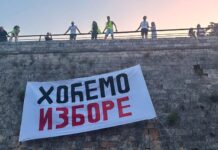In Trebinje, a 17-year-old wearing a „Hajduk – Split“ jersey had it torn off by another young man on the street. Montenegrin schools reported at least 29 cases of peer violence during May and June this year, according to data from the Ministry of Education. Four young men in Croatia are awaiting a court verdict for beating a young Slovenian who is now in a coma. In a Zagreb neighborhood, graffiti appeared on the walls reading: “Death to everyone in Zrinjevac.” Violence against students in Serbia, who have been protesting for months, has become a daily occurrence
For years, young people featured on the show PERSPEKTIVA have been warning about the spread of violence and the government’s unwillingness to confront it. Hristina from Belgrade speaks about the culture of violence, Maida from Tuzla identifies three key issues, and Adi from Mostar argues that people behave badly because they face no consequences.
“We are not living in an open conflict, but all three countries, and the entire Balkans, exist within what can be described as a culture of violence. Within this culture and under the weight of transgenerational trauma, it is very difficult to activate rational thinking. Most often, people react emotionally, and emotions here run strong because they stem from trauma.”
https://www.slobodnaevropa.org/a/perspektiva-mladi-beograd-pomirenje-/32933982.html
“I recognize three key factors. The first is the rising level of individualization, which is often misunderstood. I’ll explain that later. The second is freedom of choice, which relates to understanding human rights, something I believe is still misunderstood, because it depends on how an individual interprets freedom and rights. The third factor is the accessibility of various means, including weapons.”
https://www.slobodnaevropa.org/a/tuzla-mladi-nasilje-perspektiva/33120855.html
“People are both good and bad by nature, but they only act badly when they are allowed to. There are many opportunities to behave badly, and when we have them we take them. If laws were enforced, this wouldn’t happen.”
https://www.slobodnaevropa.org/a/perspektiva-mladi-mostar-dragan-markovina/33175130.html
Amra from Tuzla openly wonders if she should arm herself for self-defense:
“I honestly wondered, without exaggeration, without joking, if I need to get a gun? Do we all need to arm ourselves and turn this into the Wild West? But then I stopped and realized that I have to find some other way to maintain my physical and psychological well-being.»
https://www.slobodnaevropa.org/a/perspektiva-beograd-mladi-nasilje-sigurnost/32904725.html
What are the root causes? Here’s what PERSPEKTIVA participants say. Blend from Kosovo and Selman from Tuzla point to the lack of will and action of those in power, while Hristina from Belgrade speaks about violence as a form of communication:
“The biggest problem is the lack of problem-solving and the lack of will to address these issues.”
https://www.slobodnaevropa.org/a/32914444.html
“A very serious social problem is being treated superficially and flatly. And the more superficial the approach, the more frequent and severe the problem becomes.”
https://www.slobodnaevropa.org/a/tuzla-mladi-nasilje-perspektiva/33120855.html
“The very idea of violence as a means of communication, as a ‘way to resolve conflicts’, and this is in big quotation marks, because violence never solves a problem; it only creates more.”
https://www.slobodnaevropa.org/a/perspektiva-mladi-beograd-pomirenje-/32933982.html
If masked government mercenaries in Serbia beat students every day, if violence is promoted on TV screens, if politicians spread hatred, and if courts fail to punish violent offenders, then why should we be surprised by increasing violence? According to data published in Geneva on global small arms, Serbia and Montenegro rank first in Europe and third globally for the number of firearms per 100 inhabitants! Bosnia and Herzegovina ranks ninth worldwide, while North Macedonia is 13th, and Kosovo 16th.













